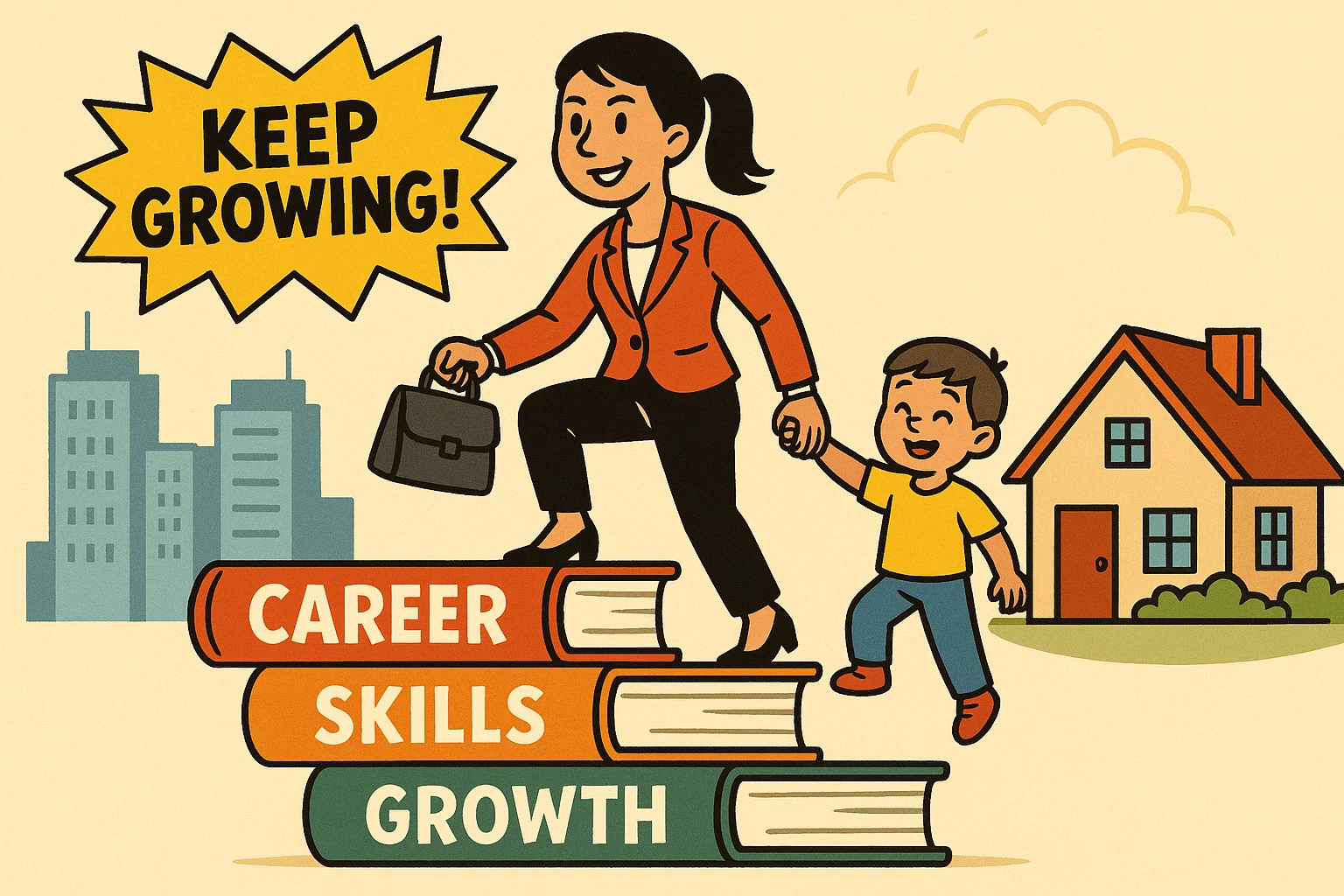Being a working mom in today’s world often feels like a constant juggling act. The demands of a professional life can frequently clash with the responsibilities of home life, leaving many women feeling stretched thin. You might find yourself grappling with mommy guilt, the exhaustion of trying to be a good mom and a great employee, or simply feeling like there aren’t enough hours in the day to accomplish everything. This guide is here to offer practical, supportive strategies to help you find a healthier work-life balance and thrive in both your career and family life.
Why Work and Family Balance Matters
Finding a healthy balance between your work and family life isn’t just about reducing stress—it brings a wealth of benefits for everyone involved.
Benefits for personal well-being
Prioritizing work–life balance can significantly reduce feelings of burnout and enhance your overall well-being. When you create clear boundaries and make time for self-care, you’re more likely to experience reduced stress, improved mental clarity, and greater emotional resilience. Research shows that maintaining a healthy work–life balance significantly reduces psychological distress, emotional exhaustion, anxiety, and depression (PMC, 2020). Another study confirmed that individuals with stronger balance reported notably fewer stress-related symptoms (Emerald, 2024). Taking care of your physical and mental health isn’t selfish; it’s essential for you to be your best self, whether you’re at work or at home.
Positive impact on children and family relationships
A parent who is present and less stressed contributes to a more stable and nurturing family life. When you achieve a better balance between work and family, you can be fully present during family time, fostering stronger bonds with your children. Quality time, even in small pockets, helps children feel secure and loved. It allows you to engage more deeply in their lives and create meaningful memories, rather than just rushing through daily tasks. This stability can positively influence children’s emotional development and academic performance.
Professional growth and productivity advantages
Surprisingly, a better work-life balance can actually boost your career. When you’re rested and less stressed, you’re often more focused, creative, and productive during work time. It allows for greater clarity and strategic thinking, preventing the typical exhaustion that can lead to mistakes or missed opportunities. Organizations are increasingly recognizing this, with many offering flexible work options that support balancing career and family commitments, understanding that a well-supported employee is a more effective one.
Common Challenges Moms Face

The path to achieving work-life balance is rarely smooth, and many working moms encounter specific hurdles.
Mom guilt and societal expectations
Perhaps one of the most pervasive challenges is mommy guilt. There’s often immense pressure, both internal and external, to excel in every role: to be a top performer at work, a perfectly patient parent, and to maintain an immaculate home. This societal expectation can lead to feelings of inadequacy, making it hard for you to prioritize yourself or your career without feeling like you’re letting someone down.
Time and energy limitations
The sheer reality of limited hours in the day is a major obstacle. Between a demanding job, household chores, meal preparation, and supporting children’s activities, working mothers often feel perpetually exhausted. Finding energy for hobbies—or even basic rest—can feel like a luxury instead of a given, which can make you feel like you can’t do everything.
Unreliable childcare and support gaps
Securing reliable and affordable childcare is a constant worry for working parents. Whether it’s daycare closures, sick kids, or the search for a trustworthy nanny, disruptions in childcare can throw a wrench into even the most carefully planned schedules. These unexpected gaps often fall disproportionately on mothers, forcing them to miss work or scramble for last-minute solutions.
Setting Boundaries for Work and Home
Establishing clear boundaries is fundamental to creating a sustainable work-life balance.
Clear separation of professional and family time
It’s crucial to define when you are “at work” and when you are “at home.” This might mean having a strict start and end time for your work obligations, especially if you work from home. When your work time is over, try to disengage from emails and work calls. Consider a ritual, like changing clothes or going for a short walk, to mentally transition from your professional life to your family life.
Learning to say no without guilt
Saying “no” can be incredibly difficult, but it’s a vital skill for managing your time and energy. Whether it’s declining an extra project at work or a non-essential commitment outside of work, remember that saying “no” to one thing allows you to say “yes” to what truly matters.
Example Scripts:
- To a colleague: “Thanks for thinking of me, but my plate is full right now. I won’t be able to take that on.”
- To a school request: “I appreciate the offer, but my current schedule doesn’t allow for that commitment. Perhaps next semester!”
Using technology to protect boundaries
Leverage technology to help enforce your boundaries. Use calendar apps to schedule not just meetings, but also family time, self-care blocks, and date night. Activate “do not disturb” mode on your phone during non-work hours to avoid distractions. Set reminders for when to log off work and when to transition to family activities.
Practical Time Management Strategies

Effective time management isn’t about fitting more into your day; it’s about managing your existing tasks more efficiently.
Creating daily and weekly schedules
Structured planning can significantly reduce the feeling of managing the chaos. Take time each week (e.g., Sunday evening) to plan out your week ahead. Map out appointments, school pickups, work deadlines, and dedicated blocks for family time. A visual schedule can help you see where your time is going and identify areas for adjustment.
Prioritizing tasks with time blocks
Categorize your tasks and allocate specific time blocks for them. This might involve:
- Work Blocks: Dedicated time for focused work.
- Family Blocks: Time for meals, homework, and playtime.
- Self-Care Blocks: Even 15-30 minutes for exercise, reading, or relaxation.
This approach helps ensure that important areas of your life receive attention and that you are able to focus on each task without feeling pulled in multiple directions.
Delegating and outsourcing help
You don’t have to do everything yourself. Don’t be afraid to ask for help!
- Delegate household tasks: Involve your partner, children (age-appropriately), or other family members.
- Outsource: If budget allows, consider hiring help for tasks like cleaning, grocery delivery, or a nanny for a few hours a week. Lightening your load is crucial to maintaining a healthy balance.
Stress Management for Moms
Being a working mother can be inherently stressful. Proactive stress management is not a luxury, but a necessity for your long-term well-being.
Quick self-care practices for busy days
Even on your busiest days, you can integrate micro-moments of self-care.
- Mindful Breathing: Take five deep breaths before a big meeting or after a challenging moment.
- Quick Stretch: Stand up and stretch for 2 minutes every hour.
- Hydration: Keep a water bottle handy and sip throughout the day.
- Music Break: Listen to one favorite song to shift your mood.
These small acts accumulate and help you feel more grounded.
Building in rest and sleep
Many working moms often don’t sleep well, sacrificing precious hours to get things done. However, consistent rest and adequate sleep are non-negotiable for physical and mental health. Aim for 7-9 hours of sleep nightly. If you’re consistently exhausted, try adjusting your evening routine, even if it means delegating some tasks or accepting that some things won’t get done perfectly.
Emotional support through counseling or peer groups
You don’t have to navigate this journey alone. Seeking emotional support can be incredibly beneficial. This might include:
- Talking to a therapist or counselor.
- Joining a working motherhood support group.
- Connecting with trusted friends who understand your challenges.
Sharing your experiences can validate your feelings and provide new perspectives.
Strengthening Family Connections

Amidst the busy schedule, nurturing strong family connections is paramount.
Making the most of quality time
Quality over quantity applies perfectly to family time. It’s not about how many hours in the day you spend, but the depth of your interactions.
- Family Meals: Sit down together without screens.
- Bedtime Stories: A consistent ritual can create powerful bonds.
- Weekend Adventures: Even a short trip to a local park or library.
These moments help you be present in the moment and truly connect.
Family rituals and traditions
Creating consistent family rituals provides a sense of security and belonging for children. This could be a weekly pizza night, a Sunday morning pancake tradition, or a special way you celebrate birthdays. These traditions don’t have to be elaborate; their consistency is what makes them meaningful.
Involving children in daily routines
Engage your children in age-appropriate ways in household tasks. This teaches responsibility and creates shared experiences. For instance:
- Younger kids: Help set the table, put away toys.
- Older kids: Assist with meal prep, laundry, or yard work.
This approach helps kids feel included and valued as part of the family team.
Building a Support System
No one thrives in isolation. A strong support system is vital for many working moms.
Partner and spouse involvement
If you have a partner, open communication and shared responsibility are key. Divide chores, childcare duties, and mental load equitably. Regularly check in with each other to ensure both partners feel supported and their needs are being met. This partnership is essential for maintaining a healthy balance.
Extended family and friends as allies
Don’t hesitate to lean on your extended family or trusted friends. They can be invaluable for occasional childcare, emotional support, or even just a listening ear. Offer to reciprocate when you can to build strong, mutually supportive relationships.
Networking with other moms
Connecting with other working moms can provide a sense of community and shared understanding. Whether through online forums, local meetups, or school groups, these connections offer a safe space to vent, share tips for balancing work, and get advice from those who truly “get it.”
Career and Growth Considerations

Maintaining a career and family life involves strategic thinking about your professional path.
Flexible work arrangements
Explore options for flexible work that can better support your family life. These might include:
| Arrangement | Description | Benefits |
| Remote Work | Working from home full-time or part-time. | Reduced commute, more control over schedule. |
| Hybrid Schedule | A mix of in-office and remote days. | Team collaboration with flexibility. |
| Part-Time Jobs | Fewer hours per week. | More availability for family, less work-related stress. |
| Job-Sharing | Two employees share one full-time role. | Reduces individual workload, maintains career continuity. |
| Compressed Workweek | Full-time hours in fewer than five days. | Longer weekends for family. |
Communicating with employers about needs
Approaching your employer with well-thought-out requests for accommodations can be very effective. Be prepared to explain how flexibility can benefit both you and the company (e.g., increased productivity, reduced turnover). Focus on solutions, like boundaries around your availability, rather than just problems.
Long-term career planning without burnout
Your career goals don’t have to be abandoned, but they might need to be reframed. Consider pacing yourself, especially after maternity leave or when children are very young. Success can look different at various stages of your parenting journey. It’s about sustainable growth, not constant acceleration.
Tips for Single Moms
Single moms face unique challenges and often carry a heavier load. Your resilience is truly admirable.
Unique challenges single moms face
Without a partner, the entire burden of income generation, childcare, and household management often falls on one person. This can intensify time and energy limitations and make it harder to ask for help or delegate tasks. Financial strain is also a common concern, as is the lack of a co-parent for emotional support.
Maximizing support networks
For single mom families, building an even stronger support network is critical. Beyond friends and family, look into community resources, single-parent groups, and local government programs that offer childcare assistance, housing support, or counseling services. Don’t hesitate to reach out; these resources exist to help.
Financial and emotional resilience strategies
Strategic financial planning is crucial. Consider budgeting carefully, exploring opportunities for increased income, and building an emergency fund. Emotionally, prioritize your mental health just as diligently as you would your children’s. Connect with other single parents who understand your unique journey. Remember, you are building a beautiful life for your family, often against incredible odds.
Final Thoughts and Encouragement
You’re navigating one of life’s most challenging yet rewarding roles. Embrace the journey with grace.
Every season looks different
Your work-life balance won’t look the same from year to year, or even month to month. When your children are infants, your focus may be heavily on family time and maternity leave. As they grow and enter school, your routine will shift again. Understand that balance is flexible, not a static state. Be adaptable and kind to yourself through these different “seasons” of working motherhood.
Small changes bring big results
Don’t aim for overnight perfection. Instead, focus on implementing one or two tips for balancing work at a time. Small, consistent efforts—like setting one firm boundary or carving out 15 minutes for self-care—can accumulate into significant positive changes over time. Progress, not perfection, is the goal.
Moms deserve support and grace
Finally, remember that you are doing an incredible job. The act of balancing career and family is immense. Extend yourself the same compassion and understanding you would offer a friend. You deserve support, whether that comes from your partner, family, friends, or a professional. Embrace your parenting journey and know that you are capable of creating a fulfilling and healthy balance for yourself and your loved ones. You are a truly amazing caregiver and professional!
Frequently Asked Questions
Let’s address some common concerns that pop up for working mothers.


